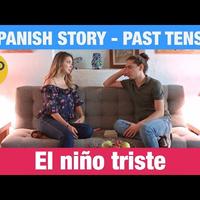Spanish Story | Past Tense | El niño triste
Hola.
Hola.
¿Qué tal tu día?
Bien, normal.
¿Y el tuyo?
Bien, también.
Bueno, sí me pasó algo.
¿Qué te pasó?
Te voy a contar.
Estaba en el parque y vi a un niño.
¿Qué viste?
A un niño.
El niño estaba triste y lloraba y lloraba.
Qué mal.
Y yo tenía un helado.
Y yo le di mi helado al niño.
¿Qué le diste al niño?
Mi helado.
Y el niño se puso feliz y sonrió.
¡Qué bien!
Sí. Pero luego el niño se terminó el helado y se puso triste.
Y lloraba y lloraba.
Ay, qué mal.
Pero yo tenía un chocolate.
Y le di mi chocolate al niño.
¿Qué le diste al niño?
Mi chocolate.
Ahh.
Y el niño se puso feliz y sonrió.
Pero se terminó el chocolate y se puso triste.
Qué mal.
Y lloraba y lloraba.
Pero yo tenía unas uvas.
Y yo le di mis uvas al niño.
¿Qué le diste al niño?
Mis uvas.
Y el niño se puso feliz y sonrió.
Qué bien.
Sí. Pero luego el niño se terminó las uvas.
Y se puso triste.
Qué mal.
Y lloraba y lloraba.
Y yo ya no tenía helado.
Ya no tenía chocolate.
Ya no tenía uvas.
¿Y qué pasó?
El niño vio a su papá y se puso contento.
Ay, qué bien.
Sí, el niño estaba feliz y sonrió.
Qué bueno por el niño.
Sí.
Por cierto, hablando de niños...a mí también me pasó algo.

